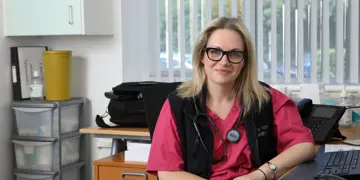
I'm a natural campaigner
Katie Bramall-Stainer, recently elected as chair of the BMA GPs committee, takes on the leadership of a ‘bruised’ profession with a strong determination to rebuild general practice. She speaks to Peter Blackburn
Maxims about the best leaders being people who don’t actively seek out power are abundant.
It is in this tradition that Katie Bramall-Stainer finds herself chair of the BMA GPs committee – giving up a job role she loved and taking responsibility for leading the profession during arguably the most challenging period in the history of the NHS.
It is a change which comes not out of a desire for decision-making and being in charge, but because of an empathy for colleagues and patients and, frankly, an overwhelming number of appeals for her to ‘step up’ from friends and supporters.
Dr Bramall-Stainer was local medical committees UK conference chair and thriving in the role – not least in securing a passionate keynote defence of general practice from Brass Eye creator Chris Morris at the 2023 conference – until taking on the leadership of GPC in August. The speech, in which Mr Morris quipped that 100 per cent of patients would rather see their GP than (then health secretary) Thérèse Coffey, went viral, with more than 350,000 views on YouTube.
‘It’s a bit of a surprise – not least to myself. If you had told me six months ago I would probably have laughed. I was asked by a considerable number of people to take on this role just under a couple of years ago but I had only just become chair of the UK conference so I felt it would be wholly inappropriate. Conference, if I’m truly honest, is where my heart lies, and it’s been difficult to walk away from that role. It’s a tremendous privilege.’
‘Rock bottom’
Dr Bramall-Stainer’s analysis, however, is that the profession and the NHS are at ‘rock bottom’. And she may be as well placed as anyone to try to enact change.
Detractors of general practice have grown in number and voice in recent months and years despite all the remarkable achievements during the pandemic and relentless increases in demand. The country, she says, cannot afford to lose expert generalists in the gatekeeper role – a ‘unique feature recommended and replicated worldwide’.
GP practices across the country are experiencing significant and growing strain with declining GP numbers, rising demand, and difficulties recruiting and retaining staff all having knock-on effects on the wellbeing and morale of the workforce and access and care for patients.
We feel very bruised as a profession.
Dr Bramall-Stainer
These are pressures Dr Bramall-Stainer has felt keenly – and, as a result, GPs are likely to feel they have an ally in their new representative. In 2010, Dr Bramall-Stainer – a notably charismatic, and convincing, public speaker – was diagnosed with MS which became so overwhelming she couldn’t even speak in consultations.
Dr Bramall-Stainer attributes regular partnership days of 12 or 14 hours and sometimes more with creating the ‘perfect storm’ of conditions for the aggressive early phases of her chronic illness. Different roles as a salaried GP, as well as a variety of leadership positions, have helped but Dr Bramall-Stainer will always look to protect and advocate for a workforce too often pushed to burnout and illness.
‘We feel very bruised as a profession – particularly through the pandemic when we were instructed to change everything overnight and we did that.
‘We need to think really carefully about protecting and sustaining general practitioners at the heart of primary care and the NHS and I’m going to be unashamedly protectionist about our workforce in that way.’
In Dr Bramall-Stainer, GPs have a representative unafraid to speak truth to power – even when doing so might become painful and problematic personally.
In 2019 Dr Bramall-Stainer and then GPC colleague Zoe Norris called out sexism and sexual harassment within the BMA and committee, leading to an independent inquiry, and subsequent report, by Daphne Romney KC and a following programme of cultural reform within the association.
‘It was difficult,’ Dr Bramall-Stainer says, reflecting on the decision to speak out and the fall-out following the revelations. ‘But a lot has changed since then. It was painful but it was important for the BMA. We’ve changed and our demographic is quite different – but we still have a long way to go.’
Key proposals
Among Dr Bramall-Stainer’s immediate ideas and priorities – a catalogue of potential solutions to crises are being drawn up constantly – are a sharp focus on the retaining of newly qualified GPs, continuity of care as a core principle, and a removal of overburdening bureaucracy and regulation.
There are detailed proposals and projects too. Dr Bramall-Stainer gives examples such as the planned introduction of easy patient access to medical records.
Her team – which includes newly elected deputies David Wrigley, Samira Anane and Julius Parker – will call for a suspension on publicity for patient access to medical records to give doctors and other staff time to adjust and urge action to redact parts of files which may put people in abusive relationships at greater risk, such as information about abortions and contraception. Many other areas of work continue.
We need to think really carefully about protecting and sustaining general practitioners.
Dr Bramall-Stainer
Dr Bramall-Stainer is keen to build on positive early relations with good-natured negotiations – ‘the department is listening to us’ at the moment, she says – aimed at rebuilding general practice and protecting the workforce. But she does not shy away from action should that relationship become unhealthy once again.
‘I think we want the same things. And I think that’s a really good place to start. But no one is under any illusion. If conversations become increasingly difficult, if we find ourselves with a record third contract imposition – a historic position – we then ourselves would have to consider unique, historic consequences.’
She adds: ‘There’s a lot of frustration out there. And goodness knows I share that. I’m a natural campaigner, I’m probably in my happy place carrying a placard and shouting… I’m not discounting action. In fact, I think action might well be necessary. And I am prepared to take it.’


